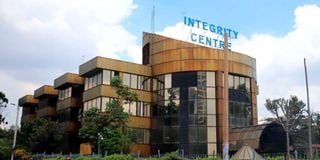We must treat combating corruption in Kenya and beyond with urgency

Integrity Centre that hosts Ethics and Anti-Corruption Commission (EACC) offices in Nairobi.
What you need to know:
- Understanding the corrosive impact of corruption reveals a disheartening tale of economic stagnation.
- The toll of corruption extends far beyond the economic sphere.
In the profound words of Kofi Annan, the former Secretary-General of the United Nations, corruption stands as a parasite, silently devouring the prosperity of a nation and strangling its economic potential.
Nowhere is this stark reality more palpable than in the diverse and resource-rich continent of Africa. Here, the grip of corruption has long hindered economic progress, perpetuating a cycle of poverty and inequality.
Understanding the corrosive impact of corruption reveals a disheartening tale of economic stagnation. In countries like Kenya, resources that could fuel vital sectors such as education, healthcare, and infrastructure are diverted for personal gain.
This diversion, in turn, extends the pattern of underdevelopment, stifling the growth that could elevate communities out of poverty.
Moreover, corruption distorts markets and creates an environment of unfair competition, particularly detrimental to the vitality of small and medium enterprises striving to carve a niche in the economic landscape.
Yet, the toll of corruption extends far beyond the economic sphere. It seeps into the very fabric of society, compromising public services and eroding trust in institutions.
In Kenya, as in many African nations, the link between corruption and increased poverty and inequality is evident. The most vulnerable segments of society bear the brunt of this societal ill, widening the gap between the privileged and the marginalised.
If circumstances persist unchecked in the next few years, the trajectory indicates a disturbing outcome: The gradual disappearance of a middle class. In this bleak scenario, the socioeconomic landscape would be divided starkly between the extremely wealthy and the impoverished.
The rich, propelled by a system that facilitates corruption, would amass unprecedented wealth, consolidating power and influence.
Meanwhile, the poor, grappling with the consequences of a corrupted system, would find it increasingly difficult to escape the clutches of poverty. This stark polarization not only threatens to worsen existing inequalities but also undermines the very notion of a thriving middle class as a cornerstone of stable and prosperous societies.
The urgency to address corruption becomes not only a matter of economic reform but a safeguard against a future where the gap between the haves and the have-nots becomes insurmountable.
The unravelling of the downward spiral goes beyond economic consequences; it strikes at the heart of institutions. Weakened by corruption, these institutions become mere shadows of their intended purpose, further facilitating corrupt practices. This erosion is not solely economic but societal, contributing to a breakdown of trust that undermines the very foundations of a functioning society.
Amidst these challenges, the private sector emerges as a beacon of hope in the fight against corruption with initiatives like The Blue Company Project leading the charge. This groundbreaking initiative, born in 2017, stands as a testament to the commitment of private sector corporations and institutions to champion the cause of transparency and integrity.
Spearheaded by volunteer individuals who are captains of industry, The Blue Company Project has garnered the support of over 400 members across East Africa who share a common vision of a corruption-free business environment.
The Blue Company Project is not merely an alliance; it is a collective force with a mission rooted in the public interest. The objective is clear: to encourage companies to take a stand against corruption in all its forms. By fostering a culture of ethical business practices, the initiative aims to dismantle the systemic issues that perpetuate corruption and hinder economic growth.
In Kenya, a transparent and corruption-free business environment is not only essential for economic growth but also paramount for attracting investments that can catalyse progress. The private sector, by adopting robust ethical practices, becomes a formidable force, demonstrating that profitability need not come at the expense of integrity.
Moreover, the private sector can actively engage in initiatives that promote transparency and accountability. Establishing strong internal compliance mechanisms, conducting regular audits, and adhering to international best practices contribute to a culture of integrity. This commitment extends beyond individual companies to industry associations, where collective efforts can reinforce ethical standards, fostering an environment where corruption struggles to take root.
To break free from the shackles of corruption, Kenya, along with other African nations, must prioritize comprehensive solutions. Strengthening institutions through reforms that enhance transparency and accountability is paramount. Drawing inspiration from successful examples across the continent, the path forward involves building and maintaining robust institutions that stand as bulwarks against corruption.
International cooperation also holds the key. Kenya can benefit from sharing best practices, collaborating on anti-corruption initiatives, and learning from successful global models. Initiatives like the African Union Convention on Preventing and Combating Corruption provide a framework for regional collaboration, emphasizing that the fight against corruption knows no borders.
The menace of corruption in Africa demands a multifaceted approach, with a special focus on nations like Kenya grappling with its impact. The continent harbours immense potential for growth, but unlocking this potential requires a collective commitment to eradicate corruption.
As the private sector steps up to play a pivotal role, joining forces with governmental and civil society efforts, there is hope for a future where Africa’s prosperity is not stifled but flourishes. The time to act is now, for the sake of current and future generations who deserve a continent free from the corrosive impact of corruption.
- Dr Kipngetich is board member of The Blue Company Project.




